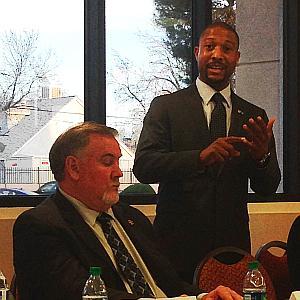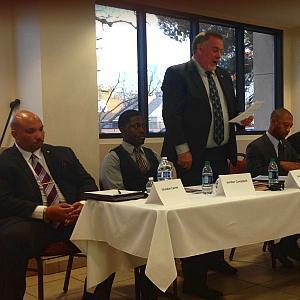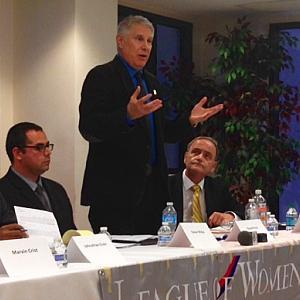LANCASTER – Vice Mayor Marvin Crist and City Council candidate Johnathon Ervin stood out from other candidates at Monday’s election forum with an intensity of uncompromising views and solutions toward those issues facing Lancaster.

Lancaster Vice Mayor Marvin Crist and council candidate Johnathon Ervin debate at the League of Women Voters Antelope Valley’s Election Forum on Monday, Mar. 10
League of Women Voters Antelope Valley* * *
CREATIVE SOLUTIONS TO PROBLEMS
Vivian Komoro, radio host of The Broad Perspective, kicked off the forum with a right-brain left-brain question on solving civic issues.
“Right brain means creative, left brain is very linear,” Komoro reminded the candidates. “How can you use that creative part of your brain to solve the problems facing the city?”
Jonathan Ervin, an aerospace engineer and USAF reservist, said leadership on the City Council doesn’t require creativity, but a need to go back to the basics.
“Unemployment rate is in the teens. That’s simple things. That’s not being creative, that’s going to work and getting jobs here,” Ervin said. “So what we need is, not creativity, but going back to the basics of assuring that things are taken care of. Not fighting with our neighbor.”
Vice Mayor Crist disagreed, saying that creative thinking has achieved state and national recognition for Lancaster as a leader in energy and sustainability.
“And the state has recognized us as the best financial city out there, the leader, to hold the (Helen) Putnam Award,” Crist added. “We’ve done a lot. LA County has said we are the most business-friendly city in LA County. … We’re doing it right.”
* * *
PALMDALE POWER PLANT & JOBS

From left, Sheldon Carter, Jordan Campbell, Vice Mayor Marvin Crist, and Johnathon Ervin
Ervin responded that the power plant is just the leverage his proposed coalition needs to barter with the state for lower energy rates – the idea being that lower utility rates will attract new business for the city.
“We do not have enough solar to have a transitionary power source,” he said. “California’s energy consumption goes up 1.2 percent every year. So, the cities are working together: Lancaster having solar, and Palmdale having a power source we can turn on at any time. This gives us great leverage for Sacramento for when I will bring the coalition together to the Public Utilities Commission, and say, ‘Hey, we want lower rates. Maybe this power plant is not going to turn on until we get those lower rates.’”
Crist disputed Ervin’s utility-rate plan, saying, “It will not, it cannot, and it is illegal to lower your rates. Jonathon doesn’t know that.”
Crist then pointed out that the real issue to the power plant is water. And with the plant consuming 4,100 acre-feet of water a year, the city is losing “thousands of jobs” it would otherwise have by using that water for creating new homes and businesses.
“So it’s going to put (it all) up into steam, and let me explain how it goes: 4,100 acre-feet of water goes up into the air, goes up into steam, and it’s gone forever,” Crist said. “The City of Lancaster uses (that amount) to water its parks.”
* * *
SPEAKING OF WATER
The candidates were then asked, if elected, would they follow the current path of city officials or take an even more active role in water-related issues – “especially making sure that water rates are one of the lowest in the Antelope Valley?”
Crist said he had just returned from a meeting discussing Cal Water, the largest water purveyor in the state, with the PUC.
“Citizens are paying five times the amount of what the people across the street are paying,” he said. “Now understand how this works. The company says, ‘Okay this is the rate’ – Cal Water wanted a 60 percent increase. We said, ‘If you do that, we will sue you – the City of Lancaster will sue you.’ We negotiated with Cal Water, and we got a 10 percent rate increase.”
Crist said that Cal Water had already agreed upon the 10 percent rate. However, it was the Taxpayers’ Rights Advocate that decided the rate increase should be at 44 percent. “So we went up there Friday and told them that we will sue you, too.”
To which Ervin replied, “We do a lot of suing in Lancaster” – receiving chuckles and applause from the public.
Ervin assured members of the public that he would address the water crisis aggressively by advocating for zero-scaping, pursuing a cash-for-grass rebate program for the city.
“Sixty percent of our water use is on your lawns,” he said. “We live like we’re in Seattle, but we actually have the climate of Arizona. I think that will go a long way in assuring that we have some leverage for how much allocation we’re going to get from the State Water Project.”
Ervin then turned to Crist, saying, “It’s like you said with the utilities – I’m going to go negotiate for electricity, which you said I couldn’t do. Which is absolutely untrue, I can do that, I will do that.”
* * *
COMMERCIAL & RESIDENTIAL DEVELOPMENT
Asked what his strategy was for filling commercial and residential vacancies, Crist said, “We have lowered the building permits. We lowered them by 25 percent in order for the builders to go in there and rehab buildings and to be able to build. We have pushed the building for the rehab of the homes that are left – we have taken the homes that are out there, and we have built them into community homes. Those community homes are for the youth. … We have partnered with a lot of our faith-based community, and we’re using these homes to make sure the kids have a place to go.”
Ervin said the city needs to offer incentive packages for developers to attract big businesses, such as call centers.
“If we’re going to do this, the residential part is one of the biggest expenditures for a company,” he said. “We can bring bigger companies here and say, ‘Hey, we’ll help you with your utilities, we’ll give you the building,” and a call center should come back. … The residential is going to be vacant as long as people don’t have jobs and are not going to be able to buy a home.”
* * *
OTHER CANDIDATE OUTTAKES

From left, Oscar Mejia, David Paul, and Michael Rives
– Sheldon Carter, an engineer and retired USAF, answered the right-brain left-brain question by saying, “There was three things that was said (by others) that fed into what I was thinking this whole time: Think out of the box, take those suggestions, and act upon them with other people’s opinions. Continuously asking the question, ‘Why?’ If you don’t wonder, you don’t progress. How do you think more creatively? By asking, ‘Why,’ by finding that reason why. … You continually evolve with education, spirtuality, any way you can through art and culture, to expand your mind.”
– Michael Rives, a retired Veterans Affairs employee, former LAPD reserve police officer and self-described ‘shadow councilman,’ told members of the public how he intends to handle the water crisis: “This is ridiculous! People have to come to the point of screaming and yelling … Why can’t your government respond before the crisis develops like this? And part of the deal was they were going to try and console these people with Cal Water excessive rates with the county. What happened to that deal? … Well we got involved in it, and we screwed it up! It’s time to face reality. We need leadership on the City Council.”
– David Paul, a retired manager and founding Tapestry Human Relations Commissioner, told people what he would bring to the council that would be unique: “I’ve been used to being ahead of the curve. Ten years ago I proposed we charter our city because just having common law cities puts us at a disadvantage. (But) I wanted the strong-mayor system, which all big cities have. The mayor is the true chief executive … So, in this situation, the districts are the councilmen’s or the aldermen’s domain, and we wouldn’t be in the situation we are today.”
– Jordan Campbell, who graduated from Lancaster High School in 2013, told listeners what unique quality he would bring to the Lancaster City Council. “First off, youth. Truly, I’m youthful. I’m bringing something that no other council (candidate) has. I just left Generation X. I was recently a kid. … I’m currently doing this not to win, not to prove something, but as an inspiration.”
– Oscar Mejia, an aerospace/ mechanical engineer, answered the right-brain left-brain question, saying, “To engage that aspect of our lives (of finding answers), it takes a person to know that they’re not always going to have the perfect answer. But there will be somebody out there that will have the perfect answer and will have an answer that works. It will be up to folks like ourselves to put those resources where they are needed.”
* * *
The 2014 General Municipal Election for the City of Lancaster will take place on Tuesday, Apr. 8, and includes two open seats on the City Council for four year terms. Polls will be open from 7 a.m. to 8 p.m., and voters must register by Mar. 24 to participate in the Lancaster election.
For more upcoming election information, visit the City of Lancaster’s website at cityoflancasterca.org.

